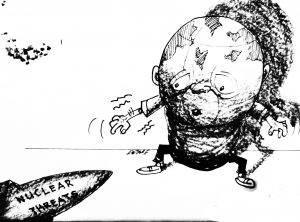In the realm of international relations, nuclear confrontations have always remained a topic of great concern and debate. As the power and proliferation of nuclear weapons continue to grow, so does the possibility of their use in conflicts.
Throughout history, nuclear confrontations have become increasingly inevitable due to the history of conflicts between nuclear-armed nations. The arms race during the Cold War era exemplified the heightened tensions and constant standoffs between superpowers such as the United States and the Soviet Union. The possession of nuclear weapons grants nations immense power and influence, thus ensuring their involvement in global affairs and potentially leading to confrontations. Furthermore, geopolitical realities, including territorial disputes and conflicts over scarce resources, exacerbate the chances of nuclear confrontations between nations, as the possession of nuclear weapons often provides a strategic advantage in such disputes.
The continued proliferation of nuclear weapons only increases the chances of future confrontations. The Nuclear Non-Proliferation Treaty, although a significant milestone, has not been able to completely halt the spread of these weapons. The acquisition of nuclear weapons by non-state actors like terrorist organizations adds an alarming dimension to the inevitability of nuclear confrontations. The potential use of these weapons by extremist groups driven by ideological motives or a desire for chaos cannot be discounted, as it poses a grave threat to global security and stability.
The rapid advancements in military technology make nuclear confrontations increasingly likely. The development of missile defense systems by some nations can undermine the nuclear deterrence strategy, leading to an increased willingness to engage in confrontation. Moreover, the emergence of cyber warfare capabilities creates new avenues for attacks on nuclear infrastructure, potentially escalating tensions to a point where conflicts become unavoidable. Technological progress also paves the way for the production of more advanced and destructive weapons, raising the stakes in potential confrontations and making the consequences of any nuclear exchange even more catastrophic.
Despite efforts to promote disarmament and reduce the risks associated with the proliferation of nuclear weapons, the inevitability of nuclear confrontations persists. To mitigate this threat, international cooperation, multilateral agreements, and effective disarmament measures will be crucial to maintaining global peace and security. The world must continue to strive for nuclear non-proliferation and explore diplomatic solutions to disputes to avoid the potential devastation of nuclear confrontations.




